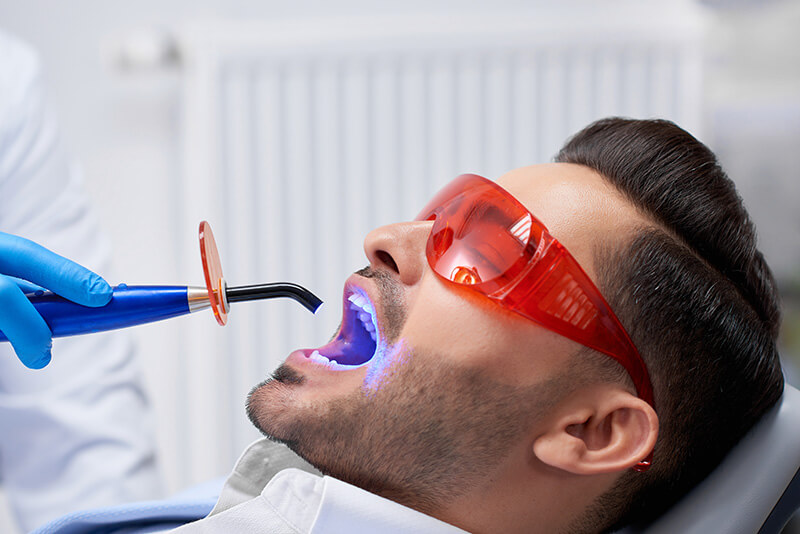Dental Filling Options to Protect Your Dental Health
If you are like most people, you will probably need a dental filling at least once in your life. Fillings prevent tooth decay from spreading and will save your tooth.
What Is a Dental Filling?
A dental filling is an artificial substance placed in a tooth with a spot of decay. It essentially “plugs” the decay and prevents it from growing; it also protects the tooth structure from additional damage.
Signs That You May Have a Cavity That Requires a Dental Filling
The only way to know for sure that you have a cavity is by going to the dentist. There are often signs you can notice that you might need a dental filling.
Tooth Sensitivity or Pain
How do you know if you need a dental filling? One indication is if your tooth feels sensitive or if you have a toothache. This could mean that you need to visit a dentist.
A Visible Hole in the Tooth
If tooth decay has grown enough, you might be able to see a visible hole in your tooth. If this happens, you most likely will need to schedule a dental appointment.
A Jagged Feeling in the Tooth When You Run Your Tongue Over it
Tooth decay eats away at the surface of the tooth. So, you might be able to feel it with your tongue.
Types of Tooth Fillings
Teeth can be filled with any number of materials. The most common types of dental fillings are composite and amalgam fillings.
Composite Fillings
Composite fillings are the most common types of fillings at most dental offices. They are made of a ceramic and plastic compound resin. They blend in and are virtually invisible because these white fillings mimic the color of natural teeth,
Amalgam Fillings
Before composite fillings were available, dental offices used a mixture of metals — commonly referred to as amalgam. These fillings are visible on the tooth because of their dark color. Although this type of filling has not been proven unsafe, many people are not comfortable with them because they contain mercury.
Dental Filling Procedure
When you go to the dentist to get a dental filling, they will likely numb the area so you don’t feel anything during the procedure. The numbness will wear off within a few hours after getting the filling.
- Your dentist will use a special drill to get rid of the decayed portion of your tooth.
- Next, your dentist will clean the area of any debris.
- Finally, your dentist will place the filling. They will polish the filling and ask you to bite down to ensure it is comfortable and not too high. Once the filling is adjusted, you are free to go about your day.
You might feel some sensitivity in the days immediately after getting the filling. This is common and usually normalizes on its own.
Why Choose Composite Fillings?
Composite fillings — or white fillings — provide a better aesthetic since they can be made to match the color of your natural tooth. Also, because they bond directly to the tooth, less of the tooth structure needs to be removed to make room for the filling.
Natural Results
Your dentist will match your composite filling to your natural tooth’s color, making the filling virtually undetectable. Composite fillings are excellent for use toward the front of your mouth, where a filling might show when you smile. The composite resin can also be used to repair small chips and cracks in teeth.
Secure Bonding
Composite resin bonds directly to the tooth surface, which creates a secure attachment to the tooth.
Long-Lasting
You can expect your tooth-colored filling to last as long as 10 years. This requires you to take good care of it through proper and daily oral care.
Improved Oral Health
If left untreated, tooth decay will continue to eat away at the tooth structure and ultimately result in tooth loss. Composite tooth fillings stop the spread of tooth decay and protect your oral health.
Maintaining Your Restoration
Avoid chewing on non-food items or hard foods (including ice) to ensure your composite tooth fillings last. Be sure to practice good oral hygiene habits by brushing at least twice a day and flossing once a day.
When to Replace a Cavity Filling
Dental fillings will wear out over time. Every time you chew, you place pressure on the filling, and eventually, it may crack, fall out or leak.
Wear and Tear
Your dentist can identify worn-out fillings at your regular dental exams. When a filling starts to show signs of wear, it’s a good idea to replace it.
Change of Color
If you notice that your tooth-colored filling is becoming darker or yellowed, it’s a sign that your filling needs to be replaced. Consult with your dentist to know for certain if it’s time to replace it.
Pain or Sensitivity at the Site
Fillings can begin to leak after time, which means that bacteria can get into your tooth beneath the filling. Ultimately, this can cause an infection in the tooth root requiring a root canal for treatment. If you feel sensitivity at the filling site, it’s time to replace it.
Getting Your Dental Fillings at West Coast Dental
Getting your dental fillings at West Coast Dental is an easy process that is virtually pain-free. If you have questions about getting a tooth filling, we invite you to give us a call.
Team of Board-certified Specialists
Our team of board-certified specialists offers the best in dental care. Our team is made up of general dentists and specialists so you can obtain the most appropriate dental treatment.
Same-day Appointments Available
If you are experiencing a dental emergency, be sure to give us a call. We reserve time in our schedule for same-day appointments when necessary.
Monthly Payment Options That Work for Your Budget
At West Coast Dental, we don’t want financial concerns to prevent you from getting the dental care you need. We offer many payment options, including cash, checks, debit cards and most major credit cards. We also offer a special dental discount program through our Dental Alliance Discount Plan and financing through CareCredit and Dental Alliance Financing. Financing ensures you can get the dental services you need and make monthly payment options that work for your budget.
Accept Most Insurances
West Coast Dental is pleased to accept most dental insurance plans. If you have questions, just give us a call.




